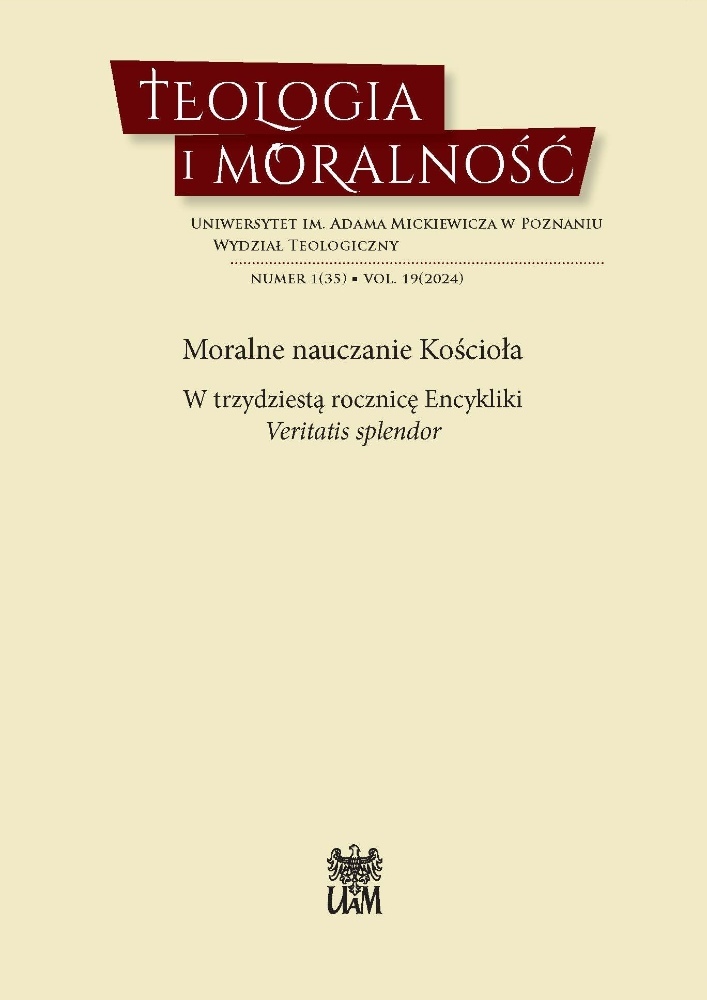Abstract
The subject of the analysis is the concept of time preference of the Flemish Jesuit and moral theologian Leonard Lessius SJ (†1623), who lived and worked in Europe during the period of great changes caused by the Protestant Revolution. Usury was still prohibited, but canon law no longer applied to everyone. The aim of the study is to demonstrate that referring to natural law helps to understand human behaviour in the economic sphere and does not contradict God’s revelation. The point of reference is the Austrian school of economics because Lessius’s discoveries heralded the understanding of the phenomenon of time preference, which later allowed representatives of this school to explain the nature of interest and usury fi nally. The analysis of the thought of the Flemish Jesuit leads to the conclusion that there is a natural order of things in the world that can be discovered with the natural light of reason infused by God.
References
Aleksandrowicz, Piotr. 2020. Kanonistyczne uzasadnienie swobody umów w zachodniej tradycji prawnej. Poznań: Wydawnictwo Naukowe im. Adama Mickiewicza w Poznaniu.
Appelt, Katarzyna. 2015. „Dlaczego Arystoteles sprzeciwiał się pobieraniu procentu?”. Annales Universitatis Mariae Curie-Sklodowska, vol. XLIX, 4 sectio H, 21-33.
Bukała, Marcin W. 2018. „Siódme: «Nie kradnij». O średniowiecznym odkrywaniu rynku na marginesie książki Paola Prodiego”. Rocznik tomistyczny, 7: 171-192.
Böhm-Bawerk, Eugeniusz. 1925. Tom I. Kapitał i zysk z kapitału. Kraków: Nakład Gebethnera i Wolff a.
Callahan, Gene. 2004. Ekonomia dla normalnych ludzi. Wprowadzenie do szkoły austriackiej. Warszawa: FijoRR Publishing.
Chafuen, Alejandro A. 2002. Chrześcijanie za wolnością. Ekonomia późnoschlastyczna. Kraków: Arcana.
Chafuen, Alejandro A. 2007. Wiara i wolność. Myśl ekonomiczna późnych scholastyków, Warszawa: Arwil.
De Soto, Jesús Huerta. 2009. Pieniądz, kredyt bankowy i cykle koniunkturalne. Warszawa: Instytut Ludwiga von Misesa.
De Soto, Jesús Huerta. 2011. Socjalizm i rachunek ekonomiczny i funkcja przedsiębiorcza. Warszawa: Instytut Ludwiga von Misesa.
Decock, Wim. 2007. “Buying and Selling (1605) by Leonardus Lessius, S.J.” Journal of Markets & Morality, 10(2) (Fall): 433-516.
Decock, Wim. 2009. “Lessius and The Breakdown Of The Scholastic Paradigm.” Journal of the History of Economic Thought, Cambridge University Press, 31(1): 57-78. DOI: https://doi.org/10.1017/S1053837209090051
Decock, Wim, 2013. “La morale à l’aide du droit commun: les théologiens et les contrats (16e-17e siècles).” Revue historique de droit français et étranger, 91: 263-281.
Decock, Wim. 2016. “Spanish Scholastics on Money and Credit.” In: Money in the Western Legal Tradition: Middle Ages to Bretton Woods Money in the Western Legal Tradition: Middle Ages to Bretton Woods, edited by David Fox and Wolfgang Ernst, 267-283. Oxford.
Decock, Wim. 2018. “Knowing before Judging: Law and Economic Analysis in Early Modern Jesuit Ethics.” Journal of Markets & Morality, 21(2) (Fall): 317-318.
Decock, Wim. 2019. Le marché du mérite: Penser le droit et l’économie avec Léonard Lessius. Bruxelles: Zones Sensible.
Dvorsky, Vaclav. 2021. Wim Decock. Le marché du mérite: Penser le droit e t l’économie avec Léonard Lessius. Brussels: Zones Sensibles, 2019, 248. Access: 02.07.2023. https://forumprawnicze.eu/attachments/article/452/Dvorsky.pdf.
Gniadek, Jacek. 2011. Dwaj ludzie z Galicji. Koncepcja osoby ludzkiej według Ludwiga von Misesa i Karola Wojtyły. Warszawa: FijoRR Publishing.
Hoppe, Hans-Hermann. 2006. Demokracja: bóg, który zawiódł. Warszawa: FijoRR Publishing.
Houdt van, Toon. 1995. “Money, Time and Labour.” Ethical Perspectives, 2(1): 11-27. DOI: https://doi.org/10.2143/EP.2.1.563068
Landreth, Harry i David C. Colander. 2005. Historia myśli ekonomicznej. Warszawa: Wydawnictwo Naukowe PWN.
Lorenc, John A. 2013. John of Freiburg and the Usury Prohibition in the Late Middle Ages: A Study in the Popularization of Medieval Canon Law. Praca doktorska. Uniwersytet w Toronto. Dostęp: 16.01.2024. https://tspace.library.utoronto.ca/bitstream/1807/35887/1/Lorenc_John_A_201306_PhD_thesis.pdf.
Lugo de, Juan. 162. Disputationes de iustitia e iure. Lyon. Access: 15.01.2024. https://latin.stackexchange.com/questions/13293/fi nding-a-latin-quote.
Jan Paweł II. 1993. Encyklika „Veritatis splendor”.
Majka, Józef. 1958. „Encyklika Vix pervertit i jej wpływ na rozwój katolickiej nauki o lichwie”. Roczniki Filozoficzne, t. 6, 2: 33-61.
Majka, Józef. 1963a. „Zagadnienie lichwy w okresie scholastyki”. Roczniki Filozoficzne, 11(2): 43-86.
Majka, Józef. 1963b. „Stanowisko chrześcijaństwa wobec lichwy w starożytności i wczesnym średniowieczu”. Roczniki Teologiczno-Kanoniczne, 10: 69-87.
Maloney, Robert P. 1973. “The Teaching of the Fathers On Usury: an Historical Study On the Development of Christian Thinking.” Vigiliae Christianae, 27(4): 241-265. DOI: https://doi.org/10.1163/157007273X00233
Menger, Carl. 2013. Zasady ekonomii. Warszawa: FijoRR Publishing.
Mises, Ludwig von. 2007. Ludzkie działanie. Traktat o ekonomii. Warszawa: Instytut Ludwiga von Misesa.
Mises von, Ludwig. 2011. Teoria a historia. Interpretacja procesów społeczno-gospodarczych. Warszawa: Instytut Ludwiga von Misesa.
Noonan, John T. Jr. 1957. The scholastic Analysis of Usury. Cambridge, Mass.: Harvard University Press.
Rothbard, Murry. N. 2006. Economic Thouth Before Adam Smith. An Austrian Perspective on the History of Economic Thought. Volume I. Auburn, Alabama: Ludwig von Mises Institute.
Salij, Jacek. 2017. „Prawo naturalne i prawa stanowione w ujęciu św. Tomasza z Akwinu”. Łódzkie Studia Teologiczne, 26(2): 103-110.
Schumpeter, Joseph A. 1972. History of economic analysis. Edited from manuscript by Elizabeth Boody Schumpeter. London: Routledge.
Zając, Kazimierz. 1996. „Zapatrywania socjalne i ekonomiczne św. Tomasza z Akwinu”. Analecta Cracoviensia, XXVIII: 173-181.
License
Copyright (c) 2024 Jacek Gniadek

This work is licensed under a Creative Commons Attribution 4.0 International License.

